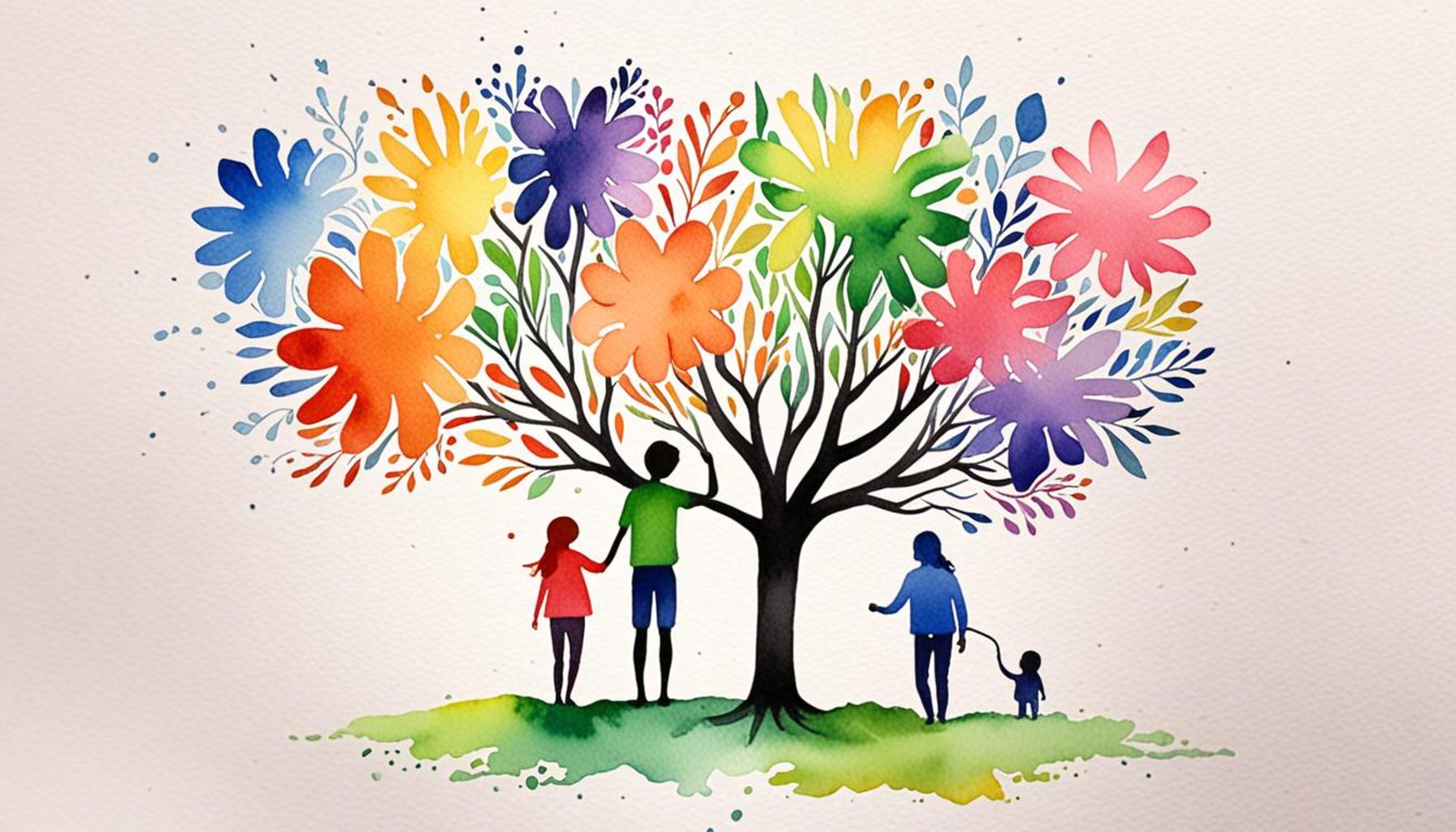Resilience and Mental Health: Techniques to Cultivate a Growth Mindset in Times of Crisis

The Importance of Resilience in Our Lives
In an ever-changing world, navigating through crises can be daunting. Whether it’s economic downturns, health pandemics, or personal hardships, maintaining strong mental health becomes imperative. Resilience emerges as a crucial trait, allowing individuals to bounce back and adapt to life’s inevitable challenges. In particular, the ability to sustain hope and positivity even during turbulent times can lead to a noticeable improvement in overall well-being.
But what does it mean to cultivate resilience? Here are some key aspects that significantly contribute to building this essential characteristic:
- Growth Mindset: Embracing challenges as opportunities for learning and personal development is fundamental to resilience. For instance, when faced with failure, individuals who view it as a stepping stone often find creative solutions and develop new skills that they wouldn’t have otherwise sought. This mindset shift encourages persistent effort, even when circumstances become tough.
- Emotional Regulation: Managing stress and expressing feelings in a healthy way is vital for mental resilience. Techniques such as mindfulness, journaling, and deep breathing exercises can help individuals process their emotions effectively. By learning to recognize and manage emotional responses, people can maintain a clearer mindset and make more rational decisions, which ultimately supports their mental health.
- Social Support: Building a network of friends, family, and communities to share experiences and advice creates a safety net in challenging times. In Nigeria, for instance, community gatherings and local support groups play a crucial role in sharing resources and encouragement. This collective strength serves as a powerful reminder that one is not alone in facing adversity.
In Nigeria, resilience is often reflected in the rich cultural practices and communal bonds that help people thrive despite difficulties. The traditional storytelling practices that echo across the country not only entertain but also impart life lessons that strengthen communal ties. These narratives often center around overcoming hardships, serving as inspiration and shared wisdom among community members.
As we delve into effective techniques for fostering a growth mindset, consider how these methods can transform your approach to challenges. Techniques rooted in positivity and adaptability not only enhance mental health but also pave the way for a more fulfilling life, even in turbulent times. Exploring these approaches can lead to a deeper understanding of ourselves and our communities, illuminating the path toward resilience and well-being.
ADDITIONAL INSIGHTS: Expand your understanding here

Techniques to Cultivate a Growth Mindset
Embracing a growth mindset is not just a theoretical concept; it is a practical approach that can fundamentally change how we perceive and tackle challenges, especially in times of crisis. This mindset fosters resilience and enhances mental health by cultivating an attitude of flexibility, learning, and adaptability. Below are several effective techniques that can help individuals develop a growth mindset, particularly when confronted with setbacks and uncertainties:
- Reframing Negative Thoughts: The way we interpret challenges can profoundly affect our ability to cope. Instead of viewing failure as a flaw, try reframing it as a learning opportunity. For instance, consider what went wrong and how you could approach similar situations differently in the future. This shift in perspective empowers you to focus on solutions rather than being bogged down by the problem.
- Setting Achievable Goals: Establishing specific, measurable, achievable, relevant, and time-bound (SMART) goals allows individuals to maintain focus during turbulent times. When overwhelmed by a crisis, breaking larger objectives into smaller, attainable steps provides clarity and a sense of accomplishment. Celebrating these small wins fuels motivation and reinforces the idea that progress is still possible, even in challenging circumstances.
- Embracing Lifelong Learning: Developing a thirst for knowledge can play a significant role in building resilience. Engaging in continuous learning—whether through formal education, workshops, or self-study—can enhance skills and confidence. In Nigeria, many organizations offer free or low-cost online courses in various fields, particularly during crises like the recent pandemic. Taking advantage of these resources fosters adaptability and prepares individuals for unforeseen challenges.
- Practicing Self-Compassion: It is crucial to treat oneself with kindness and understanding in times of crisis. Acknowledging that everyone faces difficulties can reduce feelings of isolation and promote mental well-being. Techniques such as positive affirmations and mindfulness exercises can reinforce self-compassion, allowing individuals to process their emotions better and foster resilience.
- Seeking Feedback: Encouraging and accepting constructive criticism can be invaluable for personal growth. Whether from friends, family, or mentors, feedback offers insights that can guide adjustments and improvements in one’s approach. By viewing feedback as a chance to grow rather than as a personal attack, individuals can enhance their resilience and mental health.
Africa, and specifically Nigeria, is rich in stories and experiences that highlight the power of resilience. From the way communities come together to support one another during economic hardships to family members encouraging each other through personal trials, these rich narrative threads emphasize that resilience is both an individual and collective journey. Learning to draw strength from these cultural narratives can foster a deeper understanding of resilience and contribute positively to mental health.
As we navigate through the remaining techniques for fostering a growth mindset, reflect on how these strategies can reshape your life experiences. By investing in personal development and embracing change, we can better support our mental well-being and thrive, even in turbulent times.
| Technique | Description |
|---|---|
| Mindfulness Meditation | A powerful technique that encourages self-awareness and emotional regulation during crises. |
| Positive Affirmations | These statements foster a growth mindset, helping individuals focus on potential rather than limitations. |
| Goal Setting | Establishing small, achievable goals can build resilience and create a sense of accomplishment. |
| Journaling | Writing about experiences allows individuals to process emotions and gain clarity during turbulent times. |
Maintaining a robust mental health strategy is essential in times of crisis. Utilizing mindfulness meditation can greatly contribute to emotional regulation, promoting greater self-awareness amidst chaos. Incorporating positive affirmations cultivates a growth mindset, creating a proactive approach to life’s challenges. Furthermore, setting specific and achievable goals helps establish a pathway to resilience, enabling a sense of accomplishment that fuels progress. Engaging in journaling offers a cathartic outlet, allowing individuals to reflect on their emotional states and ultimately, glean clarity from their experiences. Each of these techniques plays a critical role in helping individuals navigate through adversities effectively, fortifying mental strength for future challenges.
ADDITIONAL INSIGHTS: Expand your understanding here
Cultivating Community Support
In times of crisis, the strength of our mental health is often rooted in the connections we forge with others. Building a support network is imperative, as it not only alleviates feelings of isolation but also serves as a wellspring of motivation and resilience. In Nigeria, community ties are traditionally strong, making it easier to mobilize support during challenging times.
Engaging with Local Communities: In Nigeria, communal gatherings during events such as the culturally rich Eid celebrations or communal farming activities highlight the essence of unity. Engaging in such activities fosters a sense of belonging and shared experiences which can provide emotional support during personal or collective crises. Attending virtual community meet-ups or forums, especially during public health emergencies, can also create a space for shared learning and networking. These connections can lead to collaborative problem-solving, essential for building resilience.
Creating Safe Spaces for Conversation: It is vital to engage in open dialogues about mental health, which is often stigmatized in many Nigerian communities. Creating platforms—be it through social media, community centers, or local organizations—where individuals can discuss their struggles can promote understanding and healing. Mental health advocacy groups in Nigeria work tirelessly to dismantle the stigma around mental health issues, and joining these conversations can empower individuals to seek help, share their stories, and foster collective resilience through shared vulnerability.
Utilizing Digital Resources
The digital age has transformed how we access information and support. Leveraging online platforms offers a myriad of resources that can enhance both resilience and mental health. In Nigeria, where literacy levels vary across regions, the availability of mobile apps and websites dedicated to mental health education plays a crucial role in empowering individuals.
- Accessing Online Counseling: Services such as TherapyRoute.com or local platforms offering virtual counseling sessions provide individuals with the opportunity to connect to mental health professionals anytime, anywhere. Individuals can receive support from trained therapists without geographical constraints, making mental health resources more accessible than ever.
- Joining Online Support Groups: Social media platforms have given rise to numerous support groups targeting various issues, from anxiety to grief. By joining these communities, individuals can share experiences, encourage one another, and gain insights into coping mechanisms that have worked for others. This collective sharing creates a powerful support system that can soothe the emotional turmoil faced during crises.
Developing Mindfulness Practices
Mindfulness—the practice of being fully present—has significant implications for mental health. In times of crisis, avoiding overwhelming thoughts and focusing on what we can control becomes paramount. Adopting mindfulness techniques can support this journey toward resilience.
- Meditation and Deep Breathing: Regular meditation practices can improve emotional regulation, allowing individuals to manage stress effectively. Apps like Headspace or Calm offer guided sessions that are accessible to anyone, regardless of experience. In Nigeria, local mindfulness groups or churches often host sessions, encouraging participants to engage in this beneficial practice.
- Journaling for Reflection: Keeping a daily journal can help individuals process thoughts and emotions. This technique encourages reflection on personal experiences and growth. In Nigeria, taking just a few minutes at the end of each day to jot down experiences helps in recognizing patterns in behavior and emotions, fostering an understanding of personal development over time.
As individuals implement these techniques, the journey towards cultivating a growth mindset becomes increasingly attainable. Realizing that there are resources, both online and within communities, fosters a sense of empowerment and equips individuals with the necessary tools to navigate the complexities of life in turbulent times.
RECOMMENDED: Check out this similar article
Conclusion
In conclusion, the path to building resilience and enhancing mental health, particularly during times of crisis, is both a personal journey and a communal endeavor. By actively engaging with support networks, utilizing digital resources, and practicing mindfulness, individuals can foster a robust growth mindset that empowers them to navigate the complexities of life. The rich traditions of community support in Nigeria serve as a powerful reminder of the importance of connection in overcoming adversity. When we come together, sharing experiences and openly discussing mental health, we not only diminish stigma but also cultivate an environment where healing can thrive.
Moreover, embracing digital resources allows for unprecedented access to mental health support, breaking geographical barriers that might have once isolated individuals from necessary assistance. Whether through online counseling or support groups, technology offers tools that can significantly enhance mental well-being. Meanwhile, integrating mindfulness practices such as meditation and journaling can cultivate emotional strength, equipping individuals with the ability to process their experiences and emerge resilient.
As we reflect on these strategies, it is essential to remember that resilience is not merely a reaction to crises but a continuous evolution of our mindset. By adopting these techniques and encouraging open conversations around mental health, we can collectively build a stronger, more supportive community. In doing so, we pave the way not only for personal growth but also for a healthier society that thrives amidst challenges.


